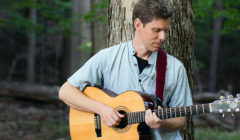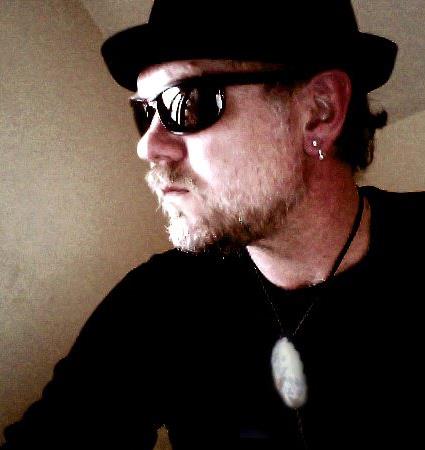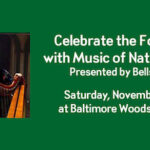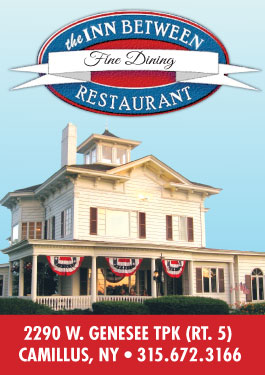Jeffrey Pepper Rodgers
Writing … Living … Writing … Playing …Writing …
Greetings, music lovers. Before we get started this month, please note the new component of my article at the end of the interview.
I’m not going to set this interview up very much, as I usually do, out of a strong respect for whom we’re interviewing this month. Jeffrey Pepper Rodgers is the one writer in this city that makes me most acute about what I’m doing as a songwriter if we’re in the same house or on the same bill. It’s not a nervous issue. It’s a respect issue. My respect for what we’re all doing goes up when Pepper is on the scene. Yup. One of those guys. And that’s why if you don’t know him already – you should. He’s not just a good or great writer. He’s an important writer.
And he lives here.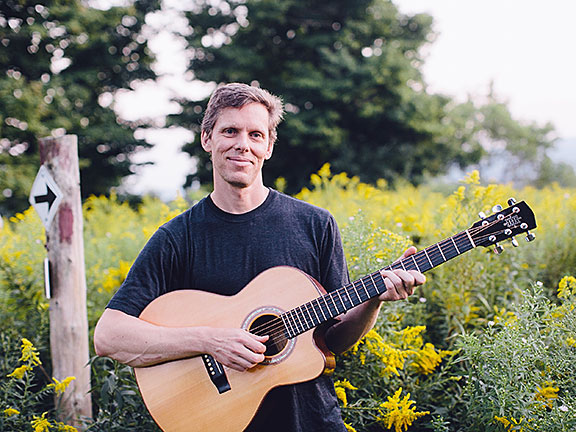
Chuck Schiele: Hi Jeffrey. Thank you for doing this interview with us here at Sounds of Syracuse.
Jeffrey Pepper Rodgers: Thank you, Chuck. My pleasure.
CS: How did you become a musician/songwriter?
JPR: My parents made the fateful decision to give my brother and me guitars when we each turned 12, and he and I competed and egged each other on and jammed together through adolescence – there’s no better way to learn than having a picking partner! We started playing actual gigs around our New Jersey hometown when I was around 14, and I started writing songs almost immediately, before I had any notion that you needed to know anything to write a song. -And I’ve never stopped.
Along with music, I’ve always loved writing, and I studied literature and creative writing in college. My passions for words and music merged when I became the founding editor of Acoustic Guitar magazine out in San Francisco, and they’ve stayed that way ever since. So my work as a writer/editor is inseparable from my work as a musician/songwriter.
CS: How long have you been doing this?
JPR: I’ve been playing guitar and writing songs for —gulp— more than 40 years. I really launched myself as a solo artist about 15 years ago, after moving to the Syracuse area.
CS: Which songwriters move you most?
JPR: My first songwriting hero was Paul Simon – I memorized every note of Bridge Over Troubled Water. I was also a huge Stevie Wonder fan as a kid, and Superstition still gives me instant goosebumps. Starting in high school, I went deep into the songwriting of Jerry Garcia and Robert Hunter, which remains a touchstone of my music. And then I discovered Tom Waits, who blew apart all my notions of what a song could be or sound like.
So those are some examples of songwriters who rocked my world. But really the list goes on and on. Lennon and McCartney of course, Bruce Cockburn, Ani DiFranco, Chris Whitley, Joni Mitchell, Elliott Smith, Anaïs Mitchell, Martin Sexton, to name a few. Through my work as a journalist, I’ve been privileged to interview many of these artists over the years and gain insight into how they write and think about music.
CS: Please tell us about the projects you are involved with.
JPR: I am awash in projects, as always.
I perform with multi-instrumentalist/songwriter Wendy Sassafras Ramsay as a duo (known as Pepper and Sassafras), and with a full acoustic band that also includes drummer/percussionist Josh Dekaney and bass/sax player Jason Fridley. The band is featured on the forthcoming album Live and Listening, recorded in May at the 443, Syracuse’s lovely new oasis for original music. (Hey, our release party is Oct. 16 at the 443, and you all should join us!) This is the follow-up to the album Almost There, which won a Sammy for Best Americana.
I teach a lot of guitar and songwriting workshops on tour and also at music camps – this summer I had an amazing week teaching at Ashokan Guitar Camp in the Catskills.
I’m editor at large for Acoustic Guitar magazine and always working on artist interviews and lessons. My latest projects are a lesson with Bruce Cockburn and a feature based on Pete Seeger’s letters to musicians that will be out soon. This journalistic work in turn feeds into my book projects – most recently, a lesson book/video called Beyond Strumming and the second edition of my book The Complete Singer-Songwriter.
I teach long-running courses on songwriting and creative nonfiction writing in the honors program at Syracuse University.
I’m gearing up this year’s edition of the Acoustic Guitar Project, an international project in which a group of songwriters each write a song in a week on the same guitar. Thirty songs have been written on our Syracuse guitar, and five more will be coming this fall. This year’s project concert is November 15 at the Folkus Project.
I’m getting ready to launch a Patreon site that will offer a stream of exclusive lessons, videos, songs, and more.
CS: Fantastic! What do you think about songwriting today?
JPR: I recently watched a video of two guys harping on contemporary pop music as being so harmonically narrow and predictable. OK, maybe that’s true to some degree, but outside of the tiny sliver of the Top 40 there is so much great, diverse songwriting. Just to take one example from my current listening: Lately I’ve been knocked out by 22-year-old Madison Cunningham, from southern California. Brilliant songwriter and guitarist too. Or check out Anaïs Mitchell, the singer-songwriter whose musical Hadestown swept the Tony Awards this year. Those who say no one writes good songs anymore just aren’t really looking.
CS: Please share a highlight or two from your music career.
JPR: Winning the John Lennon Songwriting Contest for my song Fly was an incredible experience – especially since it was the first time I’d ever entered a songwriting contest!
CS: Wow. You must be still buzzing from that.
JPR: I was a winner in the country category, which was interesting because I never really considered myself a country songwriter. But the song grew out of the fiddle tune Sally Goodin, and it’s actually much more rooted in country tradition than a lot what comes out of Nashville these days.
For the last three years I’ve done concerts celebrating Jerry Garcia’s birthday at the storied Club Passim in Cambridge, Mass., and at other venues in New England. Last year, the owner of Jerry’s iconic Wolf guitar brought the guitar to the Passim show, and we all played Wolf on some favorite Dead songs. So I got to play Eyes of the World and Crazy Fingers on Jerry’s guitar, on his birthday, at a legendary club. Pinch me.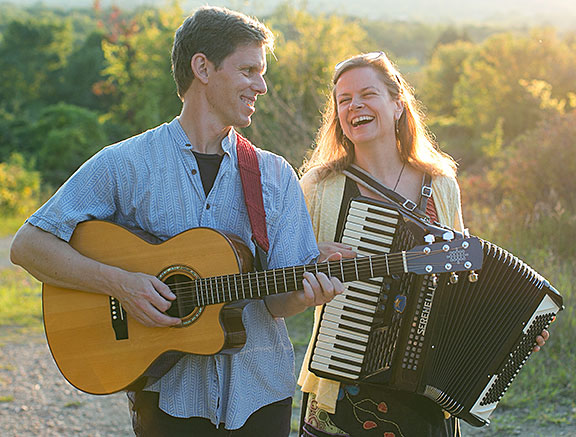
CS: Who else in CNY music community do you find notable (or interesting) as a songwriter?
JPR: We have such a deep talent pool here. As host of the Words and Music Songwriter Showcase, originally at Jazz Central in Syracuse and currently at Seneca Street Brew Pub in Manlius, I’ve spotlighted around 70 CNY songwriters. I could make a very long list, but I’m deeply impressed with the songwriting of Karen Savoca, John Cadley, Bob Halligan Jr., Ashley Cox, Mike Powell, Gary Frenay and Arty Lenin, Phil Grajko … Of course I’m biased, but Wendy Ramsay writes songs that are fresh and fun and one of a kind.
CS: The main thing about writing a song is …
JPR: Being open to discovery. If you set out in writing to execute an idea you have already finalized in your mind, your song is likely to be predictable and boring. Instead, follow your instincts and see where they lead you. Be surprised. Learn something.
CS: Writing instrument of choice?
JPR: Acoustic guitar, now and always – I’m fortunate to own a gorgeous custom instrument built 20 years ago by Toronto luthier Linda Manzer that is just packed with songs. I also like writing by singing over a beat (played on a table, knee, cajón, you name it). Some audience favorites were written this way – for instance, Sycamore Tree, Only the Soul, and How Long Till It’s Too Late, all featured on the live CD, with Josh Dekaney taking my grooves to a completely new plane.
CS: Is there any particular thing you write about, generally speaking; or something in particular that you feel defines you and your style as a songwriter? Can you characterize your songwriting “way” or style?
JPR: I’m obsessed with getting a band’s worth of sound out of an acoustic guitar and exploring different grooves. I have songs that tap into the feel of rock, bluegrass, soul/
funk, swing, blues – not because I’m trying to be clever or eclectic, but just because that variety of terrain turns me on as a songwriter.
And I’m a writer, so the words really matter to me, whether they come from personal experience or I’m making up a story or writing in a more comic/playful vein. Attention to the nuances of language, imagery, and storytelling is, I think, a defining characteristic of my songs.
CS: I think so, too. And I for one certainly appreciate your facility and prowess for the craft. Yes. -Nuances. Please offer your best advice to up-and-coming songwriters/musicians.
JPR: As I’ve written about at length in The Complete Singer-Songwriter and elsewhere, being a musician these days is like running a little cottage industry. Most of us serve as our own booking agents, labels, publicists, webmasters, and more. Actually making a living in music means being a smart entrepreneur and finding your niche. Skills like graphic design, video and audio production, website building, and social-media marketing are invaluable. Don’t let business concerns contaminate the art, but make no mistake: you are a start-up business. Think about what you have to offer that is a little different than what others are doing.
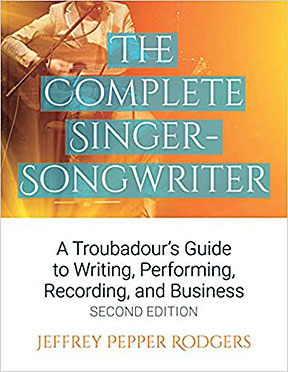
CS: What do you get out of the experience of songwriting (beside the song)?
JPR: There’s always therapeutic value in finding an external expression for something inside you. It’s validating and can connect you with others in profound ways – a good song makes you (and the listener) feel less alone. And then there’s the feeling of progress. I’ve been writing songs for decades and feel like my latest batch is the best I’ve ever written – and the next ones will be better still. It’s gratifying and energizing to feel yourself continuing to grow and learn in your art.
CS: What is in your near future, musically?
JPR: The live album release on Oct. 16 and the launch of my Patreon are the big projects in the pipeline. I’m excited!
CS: How can we all stay in touch with you and your music?
JPR: Through my website, www.jeffreypepperrodgers.com, which includes a lot of free guitar and songwriting lessons; Facebook (https://www.facebook.com/jeffreypepperrodgers); and Instagram (https://www.instagram.com/jeffreypepperrodgers). The best way to stay tuned is through my email list (sign up at http://eepurl.com/bbL4gH).
CS: Thank you, Jeffrey. It certainly has been a pleasure to do this interview with you.
JPR: Thank you, Chuck.
–––––––––––––––––––––––––––
This Month Next Month: The Premier of Revue Review
On October 2, 7pm, I will be hosting a showcase at the Listening Room 443 featuring the incredible talents of Christopher Ames, Bob Halligan Jr. and Colin Aberdeen. The event will showcase the music, songwriting, and the up-close charismatic charm of each of these local treasures in unplugged fashion. All you music gormandizing nice people will come on down to dig the show and the super cool vibe.
Then:
In the following issue I’ll talk about what happened at the show in this new Revue Review component of my column – which you are reading, right now. We’ll also announce the next Revue Review showcase. I promise to bring you compelling talent every time, so come on down and let’s have a great time. It’s good for you. It’s good for our city.
Write to chuck.schiele@gmail.com for more information; or visit https://www.facebook.com/ChuckSchieleMusic; or facebook search “Revue Review. “

